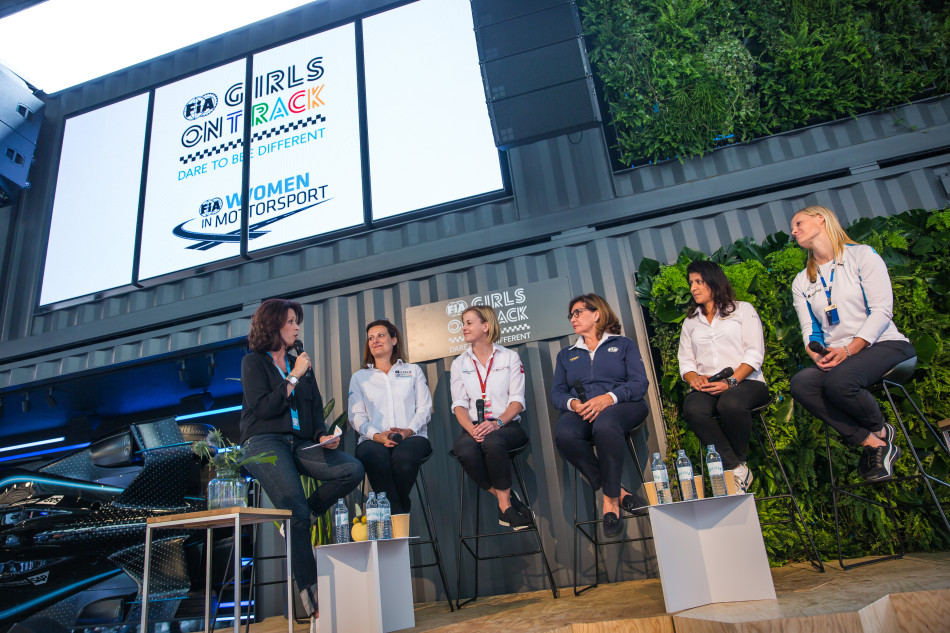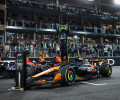Delving into the world of women in motor sport
On the occasion of the ABB FIA Formula E Championship’s Berlin E-Prix and the first European FIA Girls on Track-Dare to be Different event, a panel discussion brought together some of motor sport’s most influential women who highlighted the opportunities available to females in the sport.

The second FIA Girls on Track-Dare to be Different event attracted more than 200 young girls to come and try various fun and educational activities aimed at inspiring the next generation of young women to consider the wide variety of career opportunities open to them in motor sport. Flying the flag for the joint initiative was Michèle Mouton, President of the FIA Women in Motorsport Commission, which was responsible for the creation of the Girls on Track Karting Challenge, and Susie Wolff, founder of Dare to be Different and Team Principal at the Venturi Formula E Team.
“It’s a great pleasure to be sitting alongside these remarkable women,” said Susie Wolff to the amassed media and Formula E community. “It was my vision that we were all sitting here, in the middle of a motor sport event, on stage trying to inspire and talk about the topic of women in motor sport. It was very clear to me after hanging up my helmet that if nobody is going to do anything this sport is not going to become any more diverse, and that it is going to take a lot of energy and passion to make change. But I think the fact we are all here today shows it’s moving in the right direction.”
The passion is clear to see. “Joining forces makes us more powerful in the long term and we can have a bigger impact,” added Susie. “This movement we are creating with the FIA is making the whole industry more aware of the fact we need to be diverse. For the sport to survive in the long term we need to have equal opportunities.”
Dare to be Different was designed to inspire the next generation and Susie Wolff and Michèle Mouton stand united in their belief about increasing the talent pool. “We wanted the FIA Women in Motorsport Commission to spread the word and work at the grass roots level to show girls who never had the chance to approach the sport that it was possible,” added Michèle. “During the last two years we created and have run the Girls on Track Karting Challenge in which nine European countries and thousands of girls have been involved. We were working with girls from 13-18 years of age and Susie was doing the same but with 8-13 year olds. So automatically it was our idea to collaborate and like this we can reach a wider range of girls. Only 5% of people working in the sport are women and we must increase the number at the base of the pyramid.”
Getting factory seats, as Michèle is all too aware, is also key to progress. “We are working for this because we have a lot of successful and very talented women drivers but they never get the chance,” she added. “How long did Susie wait to get to Formula One, Simona de Silvestro, she could also have been in Formula One. We deserve to have teams that trust us and give us the same chance. When Audi called me for the WRC I was a young French girl coming to the World Championship with Hannu Mikkola who was the best driver in the world. Suddenly your pride says ‘you get the same car, will you be three seconds slower than him?’ No way! So it pushes you, your motivation, so I succeeded just because I was given this chance. To go fast it’s more in your head.”
But, FIA Girls on Track-Dare to be Different is not just about finding future female racing drivers. “If you look at this one event, there are around 30 drivers between Formula E and the support races who will compete and there’s probably around five thousand people involved in making this event happen,” added Susie. “It’s not just about finding the next female talent on track, it’s about finding them off track and inspiring them to see that motor sport is not just a man’s world. We are one of the few sports in the world that is not segregated and as Michèle showed in her career, and these ladies on stage can vouch, it is possible to be successful in this environment when you have a clear vision and goal. It doesn’t matter which gender you are, it comes down to performance.”
Cristiana Pace, a motorsport consultant and Doctoral researcher at Coventry University, is also determined to give something back to the sport as one of the programme’s ambassadors. “It is really important for me to be an ambassador and STEM leader for Dare to be Different. It’s leaving a legacy, trying to inspire the young generation of girls that they can be engineers and that engineering is not just for men,” said the Italian, who was working in the FIA Formula One Technical Department at the age of 25. “We created an engineering ‘Lego’ challenge to build a car powered by a balloon and all the girls were constantly changing their cars to make them faster. It was really moving to see, especially the really young girls making such a big effort.”
BMW, title sponsor of the Berlin E-Prix, was represented by its Head of Motorsport Marketing, Pia Schörner, the German again underlining that the motor sport platform is open to everyone. “I can tell you that my team is 70% female, they’re all doing motor sport and are the team running Formula E. There is just one male and the rest of the marketing team is female. I am really proud of that,” she said. “We have a lot of females in leading positions and I think everybody who wants to do something, female or male, can do it. Just trust yourself. So even if it’s BMW or motor sport, do what you want. You can be an engineer, a race driver, a marketing lady like me; you make it happen if you want to. I think this [FIA Girls on Track-Dare to be Different] initiative shows to everyone they can do it so it’s a really good opportunity.”
Leena Gade is perhaps one of the most notable female engineers having engineered the winning Audi in the famous 24 Heures du Mans no fewer than three times. “I was really lucky having such a good support system behind me with my family that I didn’t think anything was impossible, I was always told I could do it,” she said. “When I was growing up there weren’t any female engineers out there. My role models were guys like Adrian Newey, Ross Brawn, Patrick Head and Frank Williams, all the big names, but they were all male and I didn’t think I couldn’t do that job. I’m sure a lot of people look at the sport and they wonder how they’re going to get in and as a female they may well be put off by seeing that there’s only guys doing these things, and that’s not true. Over the last 10 years I’ve seen more female mechanics and engineers coming in and it’s great.
“I think engineering is one of those disciplines where it’s been male dominated for a long time,” added the Brit. “I know a lot of females who have gone into engineering and done it as a degree but haven’t taken the next step. I think rather than making the opportunities, it’s showing them what’s possible, especially in motor sport where there are so many different areas, not just as a race engineer but as a performance, data, engine or battery engineer.”
And Leena’s advice to the future generation? “Don’t give up. There are going to be people that might tell you it’s not possible because you’re a girl. Look at us all here, we did it.”
With the success of the first two FIA Girls on Track-Dare to be Different events at the Formula E rounds in Mexico City and Berlin, the aim is now to go global. “We plan to continue being present in different events,” confirmed Michèle Mouton. “At the FIA we are lucky to have a huge network with our 240 national sporting authorities in 144 countries so we are also working with them with the goal of implementing the programme at national level in their countries. This would be a huge achievement and make the base of our pyramid so much larger. The prospects ahead are really exciting.”

 Facebook
Facebook Twitter
Twitter






